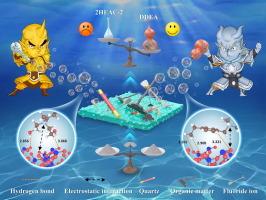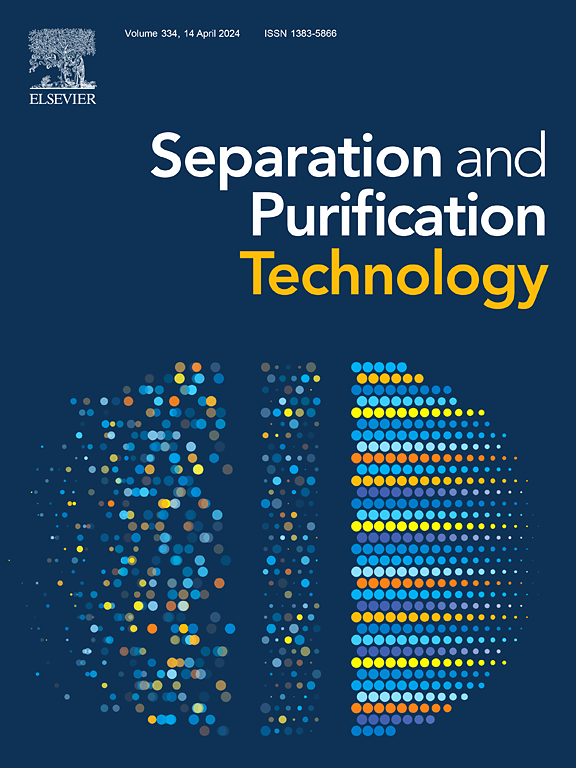新型乙基苄基和羟乙基季铵捕收剂用于磷石膏的反浮选脱硅和除杂:浮选性能和机理
IF 8.1
1区 工程技术
Q1 ENGINEERING, CHEMICAL
引用次数: 0
摘要
在用于磷石膏(PG)脱硅和除杂的反浮选工艺中,季铵盐通常用作阳离子捕收剂,但其在强酸性条件下的选择性和稳定性受到限制。本研究首次将十二烷基-二甲基-乙基苄基氯化铵(DDEA)和十二烷基-双(2-羟乙基)-甲基氯化铵(2HEAC-12)作为捕收剂,用于磷石膏反浮选脱硅除杂。浮选实验表明,DDEA 和 2HEAC-12 两种捕收剂对 PG 都具有良好的脱硅和除杂性能,而 DDEA 对石英的选择性优于 2HEAC-12。当使用 DDEA 和 2HEAC-12 作为捕集剂时,得到的 PG 浓缩物中二水石膏的纯度分别为 94.88% 和 93.47%,符合建筑材料用 PG 的一级标准(GB/T 23456-2018)。吸附实验表明,两种收集器在石英和二水石膏上的吸附均遵循 Langmuir 模型,表明存在单层物理吸附。两种收集器对石英的选择性均高于二水石膏。吸附过程主要由静电作用和氢键完成。吸附过程主要由静电相互作用和氢键完成。这项研究为开发用于 PG 反浮选高效脱硅和除杂的捕收剂提供了可行的策略。本文章由计算机程序翻译,如有差异,请以英文原文为准。

Novel ethylbenzyl and hydroxyethyl quaternary ammonium collectors for co-reverse flotation desilication and impurity removal from phosphogypsum: Flotation performance and mechanism
In the reverse flotation process for desilication and impurity removal from phosphogypsum (PG), quaternary ammonium salts are commonly used as cationic collectors, but their selectivity and stability under strongly acidic conditions are limited. In this study, for the first time, dodecyl-dimethyl-ethyl benzyl ammonium chloride (DDEA) and dodecyl-bis(2-hydroxyethyl)-methyl ammonium chloride (2HEAC-12), were used as collectors for the PG co-reverse flotation desilication and impurity removal. Flotation experiments show that both DDEA and 2HEAC-12 collectors exhibit good desilication and impurity removal performance for PG, whereas DDEA shows superior selectivity for quartz than that of 2HEAC-12. When DDEA and 2HEAC-12 were used as collectors, the purity of dihydrate gypsum in obtained PG concentrates was 94.88% and 93.47%, respectively, meeting the first-grade standard for PG used as a building material (GB/T 23456–2018). Adsorption experiments indicate that the adsorption of both collectors on quartz and dihydrate gypsum follows the Langmuir model, suggesting monolayer physical adsorption. Both collectors exhibit a higher selectivity for quartz than dihydrate gypsum. The adsorption process was mainly accomplished by electrostatic interactions and hydrogen bonds. The adsorption process was mainly accomplished by electrostatic interactions and hydrogen bonds. This work provides a viable strategy for developing collectors for PG co-reverse flotation efficient desilication and impurity removal.
求助全文
通过发布文献求助,成功后即可免费获取论文全文。
去求助
来源期刊

Separation and Purification Technology
工程技术-工程:化工
CiteScore
14.00
自引率
12.80%
发文量
2347
审稿时长
43 days
期刊介绍:
Separation and Purification Technology is a premier journal committed to sharing innovative methods for separation and purification in chemical and environmental engineering, encompassing both homogeneous solutions and heterogeneous mixtures. Our scope includes the separation and/or purification of liquids, vapors, and gases, as well as carbon capture and separation techniques. However, it's important to note that methods solely intended for analytical purposes are not within the scope of the journal. Additionally, disciplines such as soil science, polymer science, and metallurgy fall outside the purview of Separation and Purification Technology. Join us in advancing the field of separation and purification methods for sustainable solutions in chemical and environmental engineering.
 求助内容:
求助内容: 应助结果提醒方式:
应助结果提醒方式:


